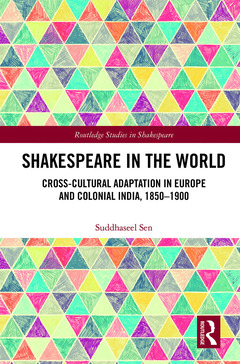Shakespeare in the World Cross-Cultural Adaptation in Europe and Colonial India, 1850-1900 Routledge Studies in Shakespeare Series
Auteur : Sen Suddhaseel

Shakespeare in the World traces the reception histories and adaptations of Shakespeare in the nineteenth century, when his works became well-known to non-Anglophone communities in both Europe and colonial India. Sen provides thorough and searching examinations of nineteenth-century theatrical, operatic, novelistic, and prose adaptations that are still read and performed, in order to argue that, crucial to the transmission and appeal of Shakespeare?s plays were the adaptations they generated in a wide range of media. These adaptations, in turn, made the absorption of the plays into different "national" cultural traditions possible, contributing to the development of "nationalist cosmopolitanisms" in the receiving cultures. Sen challenges the customary reading of Shakespeare reception in terms of "hegemony" and "mimicry," showing instead important parallels in the practices of Shakespeare adaptation in Europe and colonial India. Shakespeare in the World strikes a fine balance between the Bard?s iconicity and his colonial and post-colonial afterlives, and is an important contribution to Shakespeare studies.
List of Musical Examples
Acknowledgements
Preliminary Notes
Introduction
Shakespeare’s Reception in Non-Anglophone Cultures: Analytical Paradigms
Theorising Shakespeare Reception Relationally
Shakespeare and “Nationalist Cosmopolitanism”
Adaptation Theory and Cross-Cultural Receptions of Shakespeare
The Case Studies: Patterns and Interconnections
PART 1
1 Shakespeare Reception in France: Ambroise Thomas’s Hamlet and Its Intertexts
Introduction
Shakespeare’s Hamlet: Texts and Performances up to the Nineteenth Century
Hamlet in France: From Ducis to Dumas and Meurice
Thomas’s Hamlet as Opera Lyrique
The Operatic Ophélie
The Afterlife of Thomas’s Hamlet
2 Nationalism and Aesthetic Self-Fashioning: Giuseppe
Verdi’s Otello
Introduction
Jealousy and Vengeance in Othello and Otello (i): Racial Discourses
Jealousy and Vengeance in Othello and Otello (ii): Religious Discourses
Jealousy and Vengeance in Othello and Otello (iii): The Pressures of Patriarchy
Verdi’s Musical Choices and the Subversion of Racial Stereotypes regarding Jealousy
Conclusion
PART 2
3 Challenging the Civilising Mission: Responses to The Tempest by Bankimchandra Chatterjee and Rabindranath Tagore
Introduction
Bankim and Bengali Literature After 1857
Bankim’s Life and Literary Career
Kapālakunḍalā: Plot and Intertexts
The Tempest, Kapālakunḍalā, and Women in Nineteenth-Century Bengal (i): A Historical Perspective
The Tempest, Kapālakunḍalā, and Women in Nineteenth-Century Bengal (ii): A Symbolic Perspective
Bankim, Tagore, and the Reception History of The Tempest
4 Two Contrasting Cases of Transculturation of Shakespeare From Nineteenth-Century Bengal: Ishwarchandra Vidyasagar’s Bhrāntivilās and Girishchandra Ghosh’s Macbeth
Introduction
Part I: Vidyasagar’s Bhrāntivilās
Life and Times of Ishwarchandra Vidyasagar
Rereading The Comedy of Errors: Bhrāntivilās and Its Intertexts
Bhrāntivilās and Feminist Readings of Errors
Part II: Girishchandra Ghosh’s Macbeth
The Life and Career of Girishchandra Ghosh
Girishchandra Ghosh’s Macbeth: A Case of Colonial Mimicry?
Conclusion
Contents
Conclusion
Adaptation Studies: Synchronic and Diachronic Approaches
Nationalist Cosmopolitanism and Post-Colonial Mimicry
Cross-Cultural Shakespeare and New Analytical Frameworks
Appendix 1 “Imitation”
Appendix 2 “Śakuntalā, Miranda, and Desdemona”
References
Index
Suddhaseel Sen is Assistant Professor of English in the Department of Humanities and Social Sciences at IIT Bombay. He has a PhD in English (Collaborative Programme in South Asian Studies) from the University of Toronto and a second PhD in Musicology from Stanford University. Sen has been a Research Fellow for the Balzan Research Project, Towards a Global History of Music, directed by Reinhard Strohm. His publications include essays on Shakespeare adaptations; cross-cultural exchanges between Indian and British musicians; Richard Wagner and German Orientalism; nineteenth-century Bengali literature and culture; and films by Satyajit Ray and Vishal Bhardwaj, among others.
Date de parution : 04-2022
15.2x22.9 cm
Date de parution : 10-2020
15.2x22.9 cm
Thème de Shakespeare in the World :
Mots-clés :
Verdi’s Otello; Shakespeare Reception; Colonial India; Shakespeare Adaptation; Europe; Nationalist Cosmopolitanisms; Bengali Literature; Non-Anglophone communities; Colonial Mimicry; Nineteenth Century Bengal; Indian Adaptations; Young Men; Intermedial Adaptation; Colonial Bengal; Mad Scene; Othello’s Jealousy; Pierre Le Tourneur; Bengali Theatre; Male Sexual Jealousy; Donizetti’s Lucia Di Lammermoor; Bankim’s Writings; Post-unification Italy; La Place; Vincent Van Gogh; Boito’s Libretto; Giulio Ricordi; Shakespeare’s Othello; Bengali Intelligentsia



